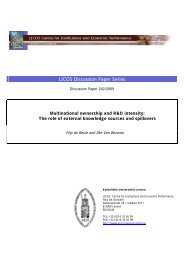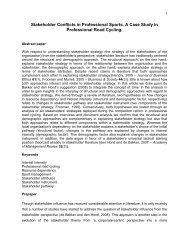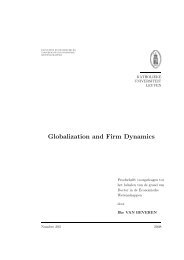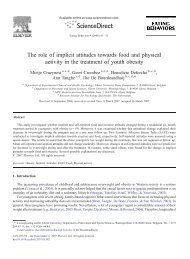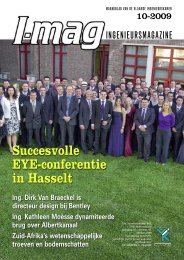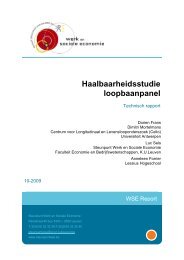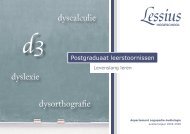View/Open - Lirias@Lessius
View/Open - Lirias@Lessius
View/Open - Lirias@Lessius
You also want an ePaper? Increase the reach of your titles
YUMPU automatically turns print PDFs into web optimized ePapers that Google loves.
112<br />
M. ERGÜN OLGUN, DIRK ROCHTUS<br />
Where modern Europe was<br />
born with the Peace Treaty of<br />
Westphalia (1648), postmodern<br />
Europe begins with the Treaty<br />
of Rome (1957) as an attempt to<br />
go beyond the nation-state<br />
No governance experience in one<br />
country can be simply copied onto the<br />
particular circumstances of another<br />
case. While we can learn from others’<br />
experiences elsewhere, the positions of<br />
the parties in dispute towards applying<br />
those learnings will vary depending on<br />
behavioral factors (e.g. perceptions and<br />
biases), historic and physical realities (e.g. demographic factors), political motivations<br />
(e.g. the visions and objectives of political parties and politicians), and<br />
highly specific economic considerations.<br />
Two powerful elements often combine to make identity-related, ethnic-driven<br />
conflicts resistant to resolution. 2 One is identity: the mobilization of people in<br />
communal identity groups based on race, religion, culture, language. The other<br />
is distribution: the means of sharing the economic, social and political resources<br />
within a society. “Where perceived imbalances in distribution coincide with identity<br />
differences… we have the potential for conflict”. 3<br />
This is why it is a daunting task to construct (or re-construct, as in the case of<br />
Cyprus) “partnership” or multi-ethnic federal or confederate arrangements where<br />
the parties are already in conflict. Additionally, third party facilitators and negotiators<br />
often assume that the legal/technical text they have negotiated will bring an<br />
end to the conflict. Federalism scholars warn, however, that “the essential nature<br />
of federalism is to be sought for, not in the shadings of legal and constitutional terminology<br />
but in the forces – economic, social, political, cultural – that have made<br />
the outward forms of federalism necessary.” 4 Therefore, unless the concerned parties<br />
share overlapping visions, have some degree of trust in each other and have<br />
very strong mutual interests in making the partnership work, even an ideal legal<br />
text on its own will not be sufficient to glue and sustain the relationship.<br />
Having made these introductory generalizations we wish to return to the case<br />
of Belgium and Cyprus. The UN 2004 Comprehensive Settlement Plan for Cyprus<br />
had targeted the adoption of the Belgian Cooperation Agreements model to<br />
regulate the relations of the constituent states with the federal government and<br />
between themselves in their areas of competence. In the separate, simultaneous<br />
referenda of April 24, 2004, for reasons that we will take up later, the Greek Cypriot<br />
side rejected the UN Comprehensive Settlement Plan by a 75.8% majority,<br />
while the Turkish Cypriot side accepted the Plan by a majority of 64.9%.



